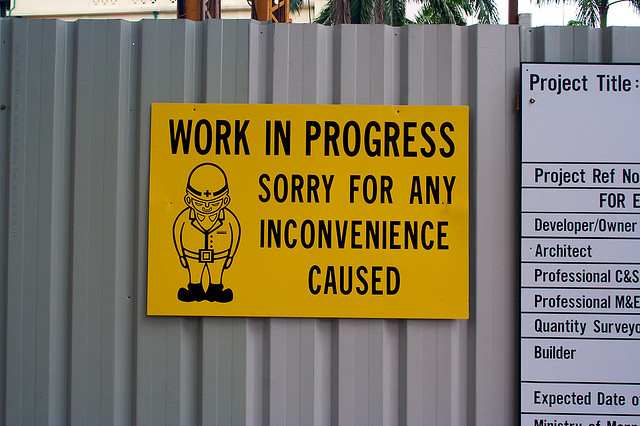Regret is the thing that will keep me up at night.
I’ll play that thing I did over and over again in my mind, certain that if I see it enough times, just maybe it will produce a different outcome. That’s how regret works.
I start on a mound of guilt and end up climbing a mountain of shame.
I convince myself that this particular mistake will be the thing by which I am judged for the rest of my life. My self-worth hinges on this moment where I fell short. I’ll be haunted by dreams during the night that convince me that the previous day’s mistakes will have been broadcast over a hidden camera, and I’ll wake up to a phone overwhelmed by hate tweets and nasty Facebook messages.
My failures will go viral.
I used to apologize way too much. I was so afraid that if I didn’t lay down on the guillotine, then everyone would be mad at me and I wouldn’t have any friends. So instead of taking the time to understand why someone was upset about something I did, I would just use those two little words that can either heal a wound or start a war: “I’m sorry.”
I’ve discovered that to keep my sanity, I can only apologize for two reasons:
1. When I screw up, and I know I screw up. This doesn’t mean that someone told me I screwed up. People tell me this more often than I want. What it does mean is that I’m conscious of how something I did hurt someone else. I come to my own conclusion
2. When the person I’ve hurt is convinced that I get it. When the person who feels pain tells me that I understand (note to self: I have to ask them if I understand) then I’m free to apologize, but only if I’ve met the first requirement.
My problem was that I used to treat apologies like duct tape: they could fix anything. Unfortunately, I’ve discovered through trial and error that duct tape doesn’t fix broken hearts, disappointments, or resentments.
Empathy might.
Over time, a curious empathy that leaves me vulnerable to another person’s pain makes defensiveness irrelevant. That’s when I’m able to discover whether there’s something worth apologizing for. That’s when I’m able to find a hurt worth connecting to.
How do you know if you’ve made a mistake?
Mistakes are relationship moments. They are opportunities to reach out and be vulnerable. When was the last time we heard a politician own a mistake? I’m not talking about those cheap “I misspoke” statements that you can find in the .99 cent aisle at Wal-Mart. I’m talking about the politician who looked into the eyes of the people she or he presumed to govern and communicated regret for a mistake because it hurt people, or let them down.
I think we’re ready for some good old fashioned authenticity. That’s why I’m pretty sure, at this point, the next authentic apology will win an election.
Now, I think I’m a decent person. Despite what my mistakes tell me, I still think I’m somewhere north of Donald Trump.
That means that most of my mistakes are unintentional.
I usually don’t mean anyone any harm. Unless you cut me off when I’m driving.
Then its on.
When I’m not driving, my mistakes are usually the result of my incurable humanity, the same incurable humanity that may speak too soon because I want to try and fix a problem before I understand the pain. When I’ve caught myself trying to use emotional duct tape, I’ve noticed that the best thing I can possibly do is express genuine regret for the pain someone is feeling, clarify my intentions in my actions, and only apologize when I can authentically connect with a mistake.
People are hurt by our mistakes because somehow our mistakes make them feel like they’re not that important to us. What a terrible and unintentional outcome. But also, what a grand opportunity to provide relief through our own attentive empathy.
I’ll probably always be looking for an easier way out. It’s just too tempting not to search for a way to make things better without actually having to do the work that an apology represents. I just haven’t discovered one yet.
Sorry about that.
Relephant:
Sorry, Not Sorry: How to Break your Apology Addiction.
Buddhadharma In Everyday Life. Lojong Slogan: Drive all Blames into One.
Author: Mathis Kennington
Editor: Renée Picard
Image: Alexander Baxevanis on Flickr












Read 0 comments and reply